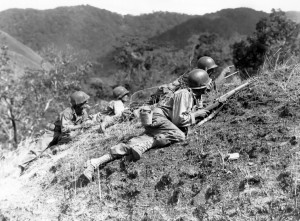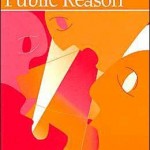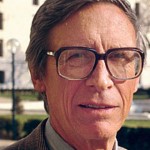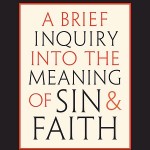While it is often said that there are “no atheists in foxholes,” the experience of war can be a destroyer of faith. Rawls wrote that he was raised in a “conventionally religious” home. He finished his undergraduate studies and entered the military as a “believing orthodox Episcopalian Christian.” Yet, by June of 1945, he had, in his own words, “abandoned it entirely.”(Rawls 2010, 261)
While claiming to not fully understand this shift himself, Rawls points to three events that took place during this relatively brief period.
In this post, I will look at the first two. The third event is finding out about the Holocaust. I will dedicate a separate post to that issue.
Kilei Ridge
In the middle of December 1944, after a particularly brutal period of combat, Rawls had a negative encounter with a Lutheran Pastor
“One day a Luther Pastor came up and during his service gave a brief sermon in which he said that God aimed our bullets at the Japanese while God protected us from theirs. I don’t know why this made me so angry, but it certainly did. I upbraided the Pastor (who was a First Lieutenant) for say what I assumed he know perfectly well–Lutheran that he was–were simply falsehoods about divine providence. What reason could he possibly have had but his trying to comfort the troops? Christian doctrine ought not to be used for that, though I knew perfectly well it was.” (262)
One of the challenges to maintaining any orthodoxy, whether a religious orthodoxy or an ideological orthodoxy, are those who are willing to twist such doctrines for nationalistic purposes, particularly war. Abraham Lincoln saw paradox in the use of the divine when it comes to the combat when he noted that “Both read the same Bible and pray to the same God, and each invokes His aid against the other.” (http://avalon.law.yale.edu/19th_century/lincoln2.asp)
The sermon at Kilei Ridge, itself, was not so much a cause for Rawls to forsake his orthodoxy, as much as it was a symbolic moment for what was a time when he realized that traditional theology failed to address the world around him. At least, it failed for him at a time when others could spin Christianity in a way that satisfied them.
Deacon’s Death
The second incident was the death of a friend named Deacon. Rawls and Deacon had volunteered to donate blood and accompany the Colonel as he observed the Japanese position. Because Rawls has the needed blood-type he donated blood while Deacon went with the Colonel.
Deacon and the Colonel were spotted quickly while on their patrol. Mortars rained in on them. They sought shelter in a foxhole. A mortar landed in the foxhole and immediately killed them both. (262)
Unlike the other two incidents, Rawls does not make a direct theological connection between this incident and his loss of orthodox faith.
“I was quite disconsolate and couldn’t get the incident out of my mind. I don’t know why this incident so affected me, other than my fondness for Deacon, as death was a common occurrence.” (262)
For Rawls, Deacon’s death undermined a sense that God’s will played a role in the life of man. The Holocaust will only further undermine his sense that there was a Diety that had anything to do with what happens on Earth.
Personally experiencing the cruelty of war undermined Rawls’ believe that there was a divine order. I think that many might come to this feeling as a result of abuse or other forms of cruelty. For others, religion brings comfort at such times. For Rawls, religion failed to provide that comfort.











